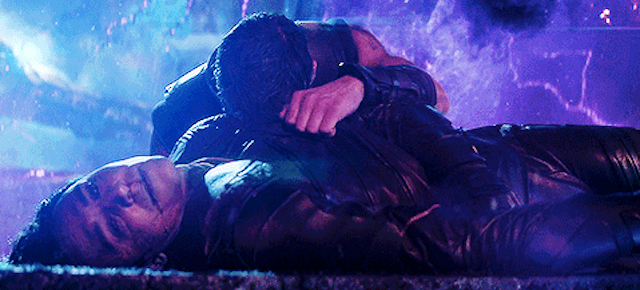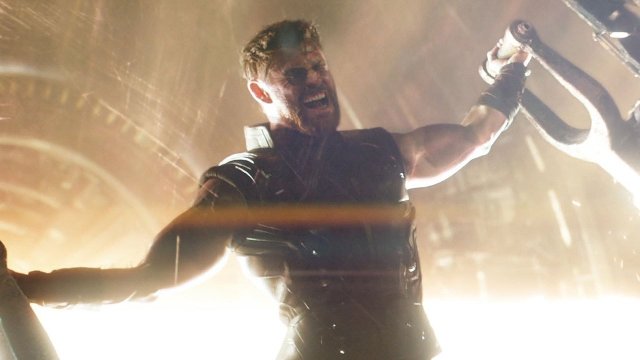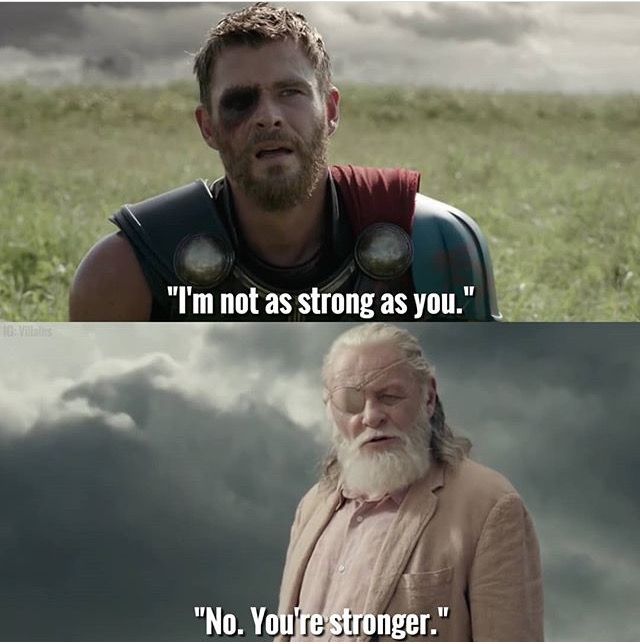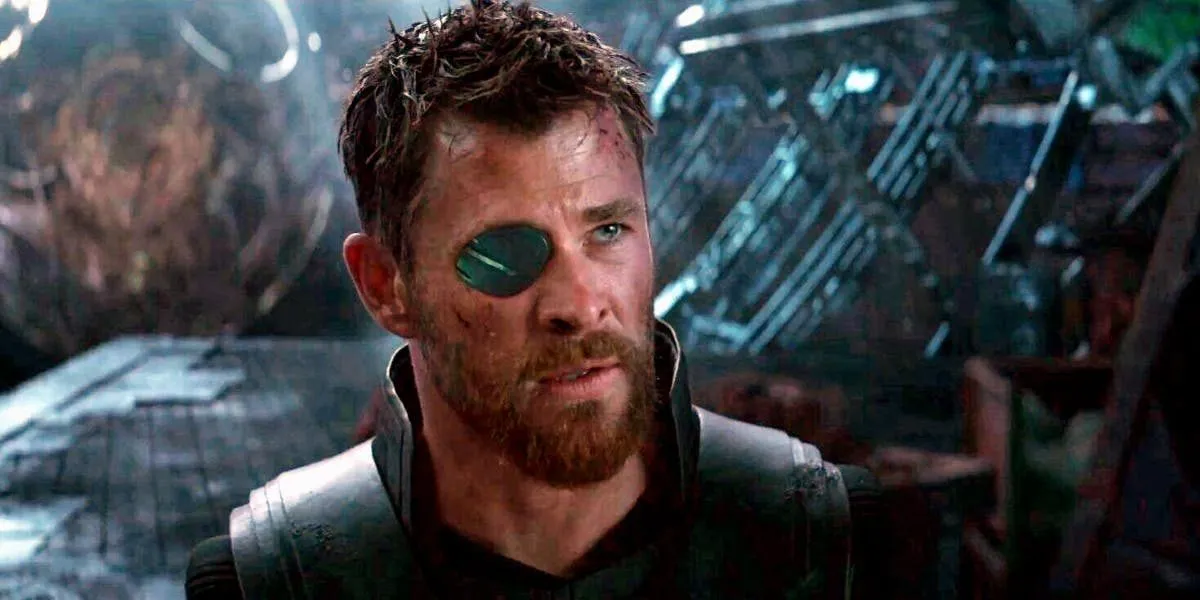Before Avengers: Infinity War came out, the Russos were running around telling interviewers that while the movie belonged to Thanos, Thor also played a crucial role and helped to drive the narrative—and they were incredibly excited about where he was going.
“I think you’ll find that Thor has a really interesting arc in the film. He hasn’t been at the forefront of other Avengers movies, but he certainly has a very important role in this film … I think you’ll see that Thor is at times hilarious and at times tragic in the film,” Joe Russo said back in March.
Anthony Russo doubled down on his brother’s assertion when asked which character he was most excited about, saying, “Thor … he’s gone through a radical transformation, and he’s moving forward in a way where he can never go back. And that’s always a fun place to be with a character as a storyteller.”
Then Infinity War actually hit the big screen, and even though Thor is one of my favorite characters, I was, shall we say, underwhelmed by what the Russos and the screenwriters actually did with him. With the movie out this week in digital, I took the time to revisit what Thor went through, and while there are some standout, fantastic moments, on the whole, the thing falls apart somewhere around Nidavellir—and by “the thing,” I mean Thor’s story arc and the idea that he undergoes any kind of “radical transformation.”
In May, I wrote about how no one has been more roundly screwed by the MCU than the characters who inhabited Thor’s orbit. By the first 10 minutes of Infinity War, Thor has lost his on-again, off-again brother, Loki; his best friend, Heimdall; half of his people to death at the hands of the Black Order; and half scattered to escape pods in space, including new pal Valkyrie (and hopefully Korg and Miek). Previous movies saw the deaths of his mother; his father; his three other best friends, Fandral, Volstagg, and Hogun; Lady Sif dusted in the Snap; and all of Asgard blew up in Ragnarok.
Thor has already suffered a lot by the time we meet him in Infinity War, but the Russos’ guiding principle in this film seems to be “we must kill who you love to make you even more motivated.” That’s … generally not how these things work in real life, but Thor is a fifteen-hundred-year-old God of Thunder, so, okay, I’ll let them take him on the hero’s journey they seemed hellbent on.
As much as I hate what happens to the Asgardians and to Thor, Loki, and Heimdall at the beginning of the movie, I’ll allow that from a narrative perspective, and in terms of character development, it’s well done. I’m a Loki fan, and it’s hard to watch his brutal strangulation at Thanos’ hands, but at least Loki goes out with a dramatic flourish that feels true to character and takes into account his realignment to Thor’s side during Ragnarok.
Loki has a great last declaration reaffirming that he is both a Prince of Asgard and the rightful King of Jotunheim, effectively reclaiming two identities he had renounced in prior Thor movies. He calls himself an Odinson again, and when he says, “Pledge to you my undying fidelity,” you rather get the sense that’s more for Thor’s benefit than Thanos’.
I could talk all day about how creatively weak it is that Loki, a hugely powerful superbeing himself, brings a tiny knife to an Infinity Gauntlet fight, but the Russos clearly needed Loki to die in order to kick off Thor’s revenge quest and to establish Thanos as Big Scary Bad. Thor is forced—literally bound and gagged—to watch his brother’s murder, and the last thing we see on board the Statesman refugee ship is Thor holding onto Loki’s body as the ship explodes around them.

At that moment, Thor is pretty broken. He’s not making any attempt to flee the ship or roaring with rage to have Thanos’ head, and when the Guardians find him floating in space, the most interesting and character-accurate part of Thor’s arc plays out. He’s determined to stop Thanos, and to do so, he thinks he needs a weapon of great power, but the best part about Thor as a character is his consistent, demonstrated lack of toxic masculinity. He routinely responds without the stereotypical traits that attend toxic masculinity, namely that “tough” men must be first and foremost violent in their reactions, and otherwise unemotional.
When he learns that Gamora is the daughter of Thanos, Thor says, darkly, “Your father killed my brother.” It’s a moment set up to see him attack her in some fashion—maybe the way Tony Stark took it out on Steve Rogers and Bucky Barnes that the brainwashed Winter Soldier killed his mom?—but instead, Thor crosses over to Gamora, gently touches her shoulder, and says, “Families can be tough.”
Thor uses all of his own hard-won experience in this department to react with empathy and sympathy, and he knows better than to blame someone for the actions of their relative. That’s what’ll happen when you’re a sensitive guy at heart and you’re related to Loki, Hela, and Odin.
Later, when Thor has his heart-to-heart with “Captain” Rocket—one of the movie’s best scenes—tears run down his cheek as he names those that he has lost, even while the scene masterfully balances on a knife’s edge of humor. Here is one of the most accomplished and powerful warriors in the galaxy, and his first instincts are empathy and to make no attempt to conceal his emotions.
He’s willing to undertake an over-the-top last-ditch quest to get Stormbreaker the axe because, “What more do I have to lose?” not for some declaration like, “I’ll make that bastard pay for what he did to me.” Once again, we have Thor as a grieving man acting out of a place of love and loss, not narrow-minded reactionary fury.
But Thor’s arc goes off the rails by the time he, Groot, and Rocket arrive at Nidavellir. There’re so many things going off the rails at once on Nidavellir that I have to break them down. First, the supremely strange acting choices made by Peter Dinklage as Eitri the dwarf. Dinklage, generally a very fine actor, isn’t even chewing the scenery; he’s demolishing it.
I saw Infinity War three times in theaters, and three different audiences erupted in laughter over Dinklage’s scenes, which were intended to be dramatic and tragic. It doesn’t help that the effect used to render him toweringly enormous is unconvincing and weird. I still have no idea what was going through anyone’s mind with the direction behind these scenes, but the gag reel bit with Dinklage saying, “Oh my god, this is going to be some bad acting” is definitely the case, and it’s distracting.

Then you have Thor’s whole self-sacrificing play to help forge Stormbreaker. I mean—okay. I guess they really wanted to make it seem like he’s done his part to earn this super lightning axe, and it shows Thor’s stubborn willfulness and strength of spirit, I guess. But it’s hard not to feel like all of the time on Nidavellir is just twiddling thumbs and so much standard superhero movie filler.
I would have much rather watched two hours of Thor chatting with Rocket than the yawn-inducing Thor-gets-roasted-by-a-the-power-of-a-star. Will he survive or won’t he?! Of course we know he’ll surivive. We’d already seen Stormbreaker in a thousand promotional materials. All Nidavellir does for me now is make me want to fast-forward through it to get to Thor’s excellent, show-stopping entrance in Wakanda. The best part of the whole sequence is Groot using his own limb to make the axe’s handle.
Other than finding Nidavellir on the whole an extremely disappointing resolution to Thor’s quest, it really drives home how little Infinity War takes into account his character development in Ragnarok. In Ragnarok, Thor’s entire arc is centered around the loss of his hammer Mjölnir, and learning throughout the course of the movie that the weapon does not define him.

He comes to understand that the hammer was never the source of his power, simply intended to help him focus it, and the lightning is his to control without need for any props.
“Are you Thor, the God of Hammers?” the vision of Odin asks the near-defeated Thor at the end of Ragnarok, prompting his son to discover the power inside of himself. Yet Infinity War seems to erase all of this, removing Thor from the action on both Earth and on other planets as he searches for what is, essentially, an even bigger hammer.
This felt like a disappointing step backward and a complete waste of Thor’s evolution in Ragnarok. Infinity War also once again makes fish-out-of-water jokes at Thor’s expense, which were already stale when Joss Whedon did them in 2012—as though this man who had a Midgardian astrophysicist girlfriend for years and was last seen debating finer points of physics with Bruce Banner can’t tell a rabbit from a raccoon.
Yes, Thor is given an epic entrance into Midgard with Rocket and Groot at his side to help turn the tide of battle in Wakanda, but we learned from the Russos’ recent commentary that the show-stopping moment wasn’t even supposed to be Thor’s. Originally, they had planned for the sudden appearance to be Captain America’s, and only shifted this when Marvel insiders were upset that Cap would be joining the movie so late in the game. According to Comicbook.com:
“[Cap] had Thor’s heroic entrance in the Wakanda battle. That was originally Cap,” Joe Russo added. “Our thinking was that he was on the run, nobody could find him, and so we thought that it would be this really compelling way to use the character […] and then we realized we had a really good spot to bring him in earlier in Scotland, to save Vision and Wanda. And so we started moving around heroic moments for characters.”
So it appears that the original intention in Infinity War wasn’t even to give Thor this triumphant, cathartic, heroic stand after all that had happened to him. That might have left him with only the scene where Thor takes on Thanos and is made to go for Thanos’ chest instead of his head, because, according to the Russos, he was motivated by the desire for Thanos to know who killed him instead of just, you know, letting a warrior with 1500 years of experience killing giant monsters kill the giant monster efficiently. As Joe Russo explained,
“Had [Thor] gone for a kill shot, that snap would not have happened. These are choices that characters who are feeling immense pain make and hopefully, the audience can learn to empathize with those characters because they can grow through stories.”
Of course, Infinity War needed Thor to not go for the kill shot because they needed the Snap to happen, but to try to pin blame for what happened on Thor, and then to say that this revenge-is-my-focus choice was made because of his pain, is a complete misunderstanding of who he is. His characterization in Infinity War is all over the place and ends up a mess after the arrival in Nidavellir. The kindest thing you can say is that at least Thor gets some character exploration, a few truly fantastic scenes, and a sense of movement, which is a lot more than you could claim for most of the too-packed Infinity War cast, the majority of whom get less than a handful of lines.
I remain unclear what sort of “radical transformation” Thor undergoes in this film except to lose all of the richer and far more radical choices director Taika Waititi made for him in Ragnarok. The Russos backstep him character-wise as well as visually, tossing him a new eye to negate what he lost to Hela, and even putting him back into the old flowing red cape and metallic sleeves of armor.
And hey, look, Thor’s got a sweet weapon again. That’s gonna sell a lot of toys.
(images: Marvel Studios)
Want more stories like this? Become a subscriber and support the site!
—The Mary Sue has a strict comment policy that forbids, but is not limited to, personal insults toward anyone, hate speech, and trolling.—










Published: Aug 3, 2018 02:37 pm